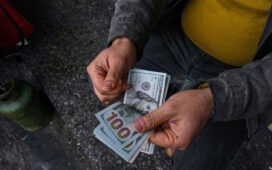Q: The World Trade Organization was created to oversee international trade. What is its role now?
Since the late 1940s, under American leadership, a rules-based multilateral system has been operating, and its performance has been outstanding. It has been associated with increasing trade liberalization. It has allowed millions of people living in Asia and other poor countries to rise out of poverty, and by and large countries have respected its rules. This is how the WTO operated, I would say, until 2015 or so.
Since that time, the WTO’s attractiveness and its power have been considerably diminished. The United States, which had led this institution, became, under Donald Trump, its biggest violator. The most important principle is that all nations who belong to the World Trade Organization are “most favored.” That is to say they should all be treated equally. Secondly, America pledged to bind its tariff, as do all WTO members, at particular rates. And on average, these were around 3%. What the Trump moves indicate or represent a complete violation of those principles. It’s treating trading partners completely differently, demanding reciprocity, which is a complete violation of the rules and raising tariffs at multiples of the rates which America pledged never to exceed.
In addition, the United States, starting back with President Obama, began to veto appointments to the WTO’s dispute settlement system. Today the appellate body no longer functions because they can’t make appointments. So not only is the WTO in trouble because it cannot apply effective negotiations, it’s also in trouble because it cannot enforce its rules.
Additionally, we’ve seen many regional trade agreements created in the past couple of decades. Some argued these were substitutes for the WTO, others that they were complementary, but they showed that the WTO no longer had a monopoly on where the rules were being written. There are certain regional agreements—in Asia in particular, but also in Africa—that are thriving today.
Another huge problem that has confronted the trading system is how we absorb a country that operates by different rules and is the largest exporter in the world: China. How can the more market-oriented western countries coexist in a single framework with China, particularly as Chinese exports have become increasingly disruptive of labor markets around the world. This has become a very salient issue. People are calling for different solutions, but it’s widely recognized that the WTO is subject to huge stress because of the different views on how the system should operate.
Q: Are we in a global trade war? What does economic tell us will happen next?
At the moment, nobody knows. One view is that we’re increasingly going to see the United States separate from the rest of the world. The old debate was, do we decouple the West from China? The new debate is going to be, does the rest of the world really need the United States?
We are, after all, only about 12% of world trade. And so, can the 88% just simply get along without us? What we can expect is that if these tariffs remain in place for a long time, the goods that would have come here from China and elsewhere are going to go to third markets, and this trade deflection could in turn give rise to protectionist pressures in those other countries. That’s the great danger of whether the impact spreads to the rest of the world. Moreover, there are many countries, most notably our neighbors, Canada and Mexico, who are very dependent on the American market, and they’re going to experience a slowdown and perhaps recessions, and in turn, their sluggishness can be spread to the rest of the world. So, in the long run, there are negative consequences that are likely to result from these measures.
Q: How would tariffs impact the dollar?
There are kind of two effects at play. If you ask what happens when you put on tariffs, generally the answer will be the exchange rate will strengthen. So, you would expect, as I said earlier, that the dollar will strengthen. On the other hand, if this is like a big supply shock and if we have a weak American economy, that in turn could cause an increase in the price level in the United States and could feed into wages so that the Federal Reserve has to slow down the economy. And investors may find the U.S. a less attractive place, and dollars become a less attractive currency to purchase. So, it’s a very tricky thing to forecast over the medium term.
There’s another question. The administration’s position is to acknowledge that there may well be a slowdown and there may well be inflation, but this is short-term pain for a long-term gain because eventually these high tariffs are going to spur foreigners to come and set up their production facilities in the United States.
Firstly, even if this works, it will take a long time to plan a factory, to find the location, to get the permits, to find the workers. And it can be a very lengthy process—on the order of two to four years—before you start to see the fruits. And I don’t think we would see significant effects before Donald Trump has left office.
Secondly, in order to make those investments, foreigners have to be convinced that these policies will remain permanent, but the way they’ve been rolled out and the kind of disruption they’re going to cause is going to lead to a political reaction that is going to cause a lot of uncertainty. And with uncertainty, foreign investors are going to be unlikely to sink their capital into investments that are premised on the idea that the market will remain permanently protected.
Q: Are there concerns at all about the role of the dollar as the global reserve currency?
Yes, we have an amazing privilege in the United States. Traditionally, as soon as there’s any trouble in the world, people flee to the safe haven of the U.S. dollar. Even after the 2008 financial crisis, despite the fact we caused it in our own housing market, the dollar strengthened. All of this is based on foreign faith that the United States is a strong economy and is governed by the rule of law. And what we’re seeing today in a variety of places is that Americans are starting to question the validity of rulings by courts, and I think this is a significant impact. A second danger is that foreigners sometimes see their currency holdings used against them in the form of economic sanctions, and this undermines their willingness to hold the dollar as a reserve currency.
The full faith and credit of the United States is vital in sustaining our position as the central reserve currency of the world, and the kind of instability that we’re seeing today stands as a threat. In addition, picking on our allies and taking these steps is severely undermining the goodwill that foreigners have towards the United States and their faith in the United States as an economy that is a model for them. The long run undermining of our soft power, as our colleague Joe Nye refers to it, will take its toll, and that in turn will impact people’s confidence in the United States as a secure and safe haven.
—
Banner photograph by AFP/China OUT/Getty Images; portrait by Martha Stewart.



